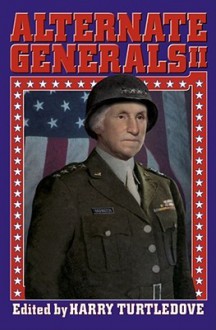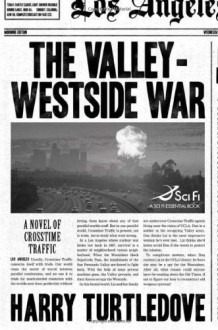
The dustjacket cover is a piece of irrelevant silliness; there are no stories in this volume involving Lee and Grant as Roman commanders. What it does contain is thirteen original short stories premised in a variety of different histories. The stories are:
“A Key to the Illuminated Heretic” by A. M. Dellamonica – Joan of Arc fails to recant, and instead survives to lead a sect of Christian dissidents fighting for their survival.
“The Road to Endless Sleep” by Jim Fiscus – A Roman centurion loyal to Marc Antony finds himself the commander of Cleopatra’s bodyguard after their triumph over Octavian.
“Not Fade Away” by William Sanders – General Douglas MacArthur does not escape from the Philippines in 1942 but instead ends up a prisoner of the Japanese.
“I Shall Return” by John Mina – Having been assigned to the Philippines, Dwight Eisenhower and his subordinates George Patton and Jimmy Doolittle mount a much more successful defense of the islands from Japanese invasion.
“Shock and Awe” by Harry Turtledove – Instead of a religious following, Jesus inspires a military uprising against the Romans.
“A Good Bag” by Brad Linaweaver – During a 1910 seance, General Francis Younghusband receives a message from the past that warns of the necessity of war between Britain and Germany.
“The Burning Spear at Twilight” by Mike Resnick – Jomo Kenyatta devises a very modern campaign to drive the British from Kenya.
“‘It Isn’t Every Day of the Week’” by Roland J. Green – A daring naval decision by Captain Stephen Decatur leads to a very different War of 1812.
“Measureless to Man” by Judith Tarr – Genghis Khan’s conversion to Judaism creates a much different Mongol Empire – and spawns a doctrinal conflict with their counterparts in Europe.
“Over the Sea from the Skye” by Lillian Stewart Carl – The Duke of Cumberland’s defeat at the hands of Bonnie Prince Charlie creates a difficult situation for a young woman.
“First, Catch Your Elephant” by Esther M. Friesner – Hannibal’s pachyderm-equipped invasion of Italy faces difficulty when his men run out of food in the Alps.
“East of Appomattox” by Lee Allred – Robert E. Lee is sent on a diplomatic mission to London for a victorious Confederacy facing difficulties.
“Murdering Uncle Ho” by Chris Bunch – In a North Vietnam occupied by invading American forces, an American commando mission is sent on a mission to eliminate the surviving Communist leadership.
Like any short story collection, individual readers will have their own favorites from among the offerings, but the range of tales offers something for just about any fan of alternate history. Overall, this is a good entry to a solid series, one that offers intriguing tales into worlds that might have been.

 Log in with Facebook
Log in with Facebook 








